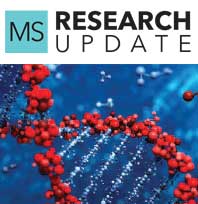Aubagio® (teriflunomide)

In this Update
FDA-Approved Medications: Recently Approved
FDA-Approved Medications: New Data on Previously Approved Medications: Oral Medications
Company: Sanofi Genzyme
- Starting dose: 7 mg once daily
- Approved in 2012; indicated for relapsing forms of MS
Previous: Tecfidera® (dimethyl fumarate) | Next: Gilenya® (fingolimod)
As is the case with many other disease-modifying therapies (DMTs) used to treat MS, the exact mechanism by which Aubagio® (teriflunomide) exerts its therapeutic effect has not yet been fully determined. In the case of Aubagio, the mechanism may involve reducing the number of activated lymphocytes – immune-system cells – in the central nervous system. The medication has anti-inflammatory properties and has been shown to inhibit the synthesis of pyrimidine, an organic compound involved with various cells and processes throughout the body.43
Recently reported study results indicate that Aubagio may alleviate the fatigue that commonly afflicts individuals with relapsing-remitting MS (RRMS).
Teri-FAST, an observational study conducted in France, followed 210 patients with RRMS who were receiving 14 mg daily of Aubagio. Of these patients, 110 had not received a disease-modifying therapy (DMT) prior to Aubagio, and 100 had switched to Aubagio from another DMT. Fatigue was measured using EMIF-SEP, the French version of the Modified Fatigue Impact Scale. Data on fatigue and medication adherence were collected at baseline and at six months, one year, and two years after treatment initiation.
After two years, the overall mean reduction from baseline in EMIF-SEP scores was 1.5 points, suggesting a decrease in fatigue with Aubagio. Significant mean two-year EMIF-SEP score reductions were also reported among those previously treated with other DMTs, suggesting that Aubagio may reduce fatigue regardless of the patient’s treatment history. At the two-year point, 126 patients were still taking Aubagio, with 123 of these patients taking the medication daily. Adverse events were reported in 27.5% of the total patient population.49
Another study showed that Aubagio helped patients maintain quality of life over two years, even though adverse effects (AEs) with the medication were common.
The Teri-LIFE study followed 200 adults in Scandinavia treated with Aubagio 14 mg daily for RRMS. Patients’ quality of life assessed was every six months with the Short Form-36 (SF-36) questionnaire. Slightly more than seven of 10 participants were women. The mean age for all participants was 44.1 years, and the mean time since diagnosis at study entry was 3.6 years. The median Expanded Disability Status Scale score was 2.0, suggesting that many patients had mild to moderate disability at study initiation.
Mean SF-36 scores remained stable from baseline through Year 2, ranging from 46.5 to 47.7 for the physical component and from 46.6 to 48.8 for the mental component. The on-treatment annualized relapse rate was 0.17, and 79% of patients experienced no relapses.
At the two-year mark, 118 individuals (59%) were still taking Aubagio; 22% had discontinued because of adverse events (AEs), 9% stopped due to lack of efficacy, and 10% discontinued for other reasons. The most common AEs reported were hair thinning (26.5%), diarrhea (23%), and fatigue (20%). Serious AEs were reported by 11% of patients. These percentages, were similar to the prevalence of AEs reported in clinical trials of Aubagio.50
Previous: Tecfidera® (dimethyl fumarate) | Next: Gilenya® (fingolimod)
